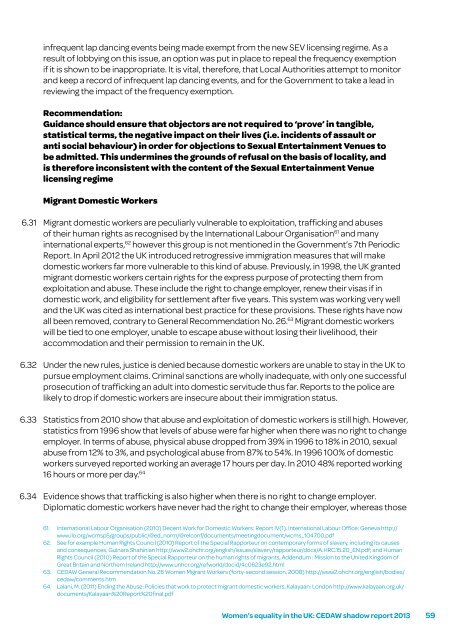Women’s equality in the UK – A health check
Women’s equality in the UK – A health check
Women’s equality in the UK – A health check
You also want an ePaper? Increase the reach of your titles
YUMPU automatically turns print PDFs into web optimized ePapers that Google loves.
6.31<br />
6.32<br />
6.33<br />
6.34<br />
<strong>in</strong>frequent lap danc<strong>in</strong>g events be<strong>in</strong>g made exempt from <strong>the</strong> new SEV licens<strong>in</strong>g regime. As a<br />
result of lobby<strong>in</strong>g on this issue, an option was put <strong>in</strong> place to repeal <strong>the</strong> frequency exemption<br />
if it is shown to be <strong>in</strong>appropriate. It is vital, <strong>the</strong>refore, that Local Authorities attempt to monitor<br />
and keep a record of <strong>in</strong>frequent lap danc<strong>in</strong>g events, and for <strong>the</strong> Government to take a lead <strong>in</strong><br />
review<strong>in</strong>g <strong>the</strong> impact of <strong>the</strong> frequency exemption.<br />
Recommendation:<br />
Guidance should ensure that objectors are not required to ‘prove’ <strong>in</strong> tangible,<br />
statistical terms, <strong>the</strong> negative impact on <strong>the</strong>ir lives (i.e. <strong>in</strong>cidents of assault or<br />
anti social behaviour) <strong>in</strong> order for objections to Sexual Enterta<strong>in</strong>ment Venues to<br />
be admitted. This underm<strong>in</strong>es <strong>the</strong> grounds of refusal on <strong>the</strong> basis of locality, and<br />
is <strong>the</strong>refore <strong>in</strong>consistent with <strong>the</strong> content of <strong>the</strong> Sexual Enterta<strong>in</strong>ment Venue<br />
licens<strong>in</strong>g regime<br />
Migrant Domestic Workers<br />
Migrant domestic workers are peculiarly vulnerable to exploitation, traffick<strong>in</strong>g and abuses<br />
of <strong>the</strong>ir human rights as recognised by <strong>the</strong> International Labour Organisation 61 and many<br />
<strong>in</strong>ternational experts, 62 however this group is not mentioned <strong>in</strong> <strong>the</strong> Government’s 7th Periodic<br />
Report. In April 2012 <strong>the</strong> <strong>UK</strong> <strong>in</strong>troduced retrogressive immigration measures that will make<br />
domestic workers far more vulnerable to this k<strong>in</strong>d of abuse. Previously, <strong>in</strong> 1998, <strong>the</strong> <strong>UK</strong> granted<br />
migrant domestic workers certa<strong>in</strong> rights for <strong>the</strong> express purpose of protect<strong>in</strong>g <strong>the</strong>m from<br />
exploitation and abuse. These <strong>in</strong>clude <strong>the</strong> right to change employer, renew <strong>the</strong>ir visas if <strong>in</strong><br />
domestic work, and eligibility for settlement after five years. This system was work<strong>in</strong>g very well<br />
and <strong>the</strong> <strong>UK</strong> was cited as <strong>in</strong>ternational best practice for <strong>the</strong>se provisions. These rights have now<br />
all been removed, contrary to General Recommendation No. 26. 63 Migrant domestic workers<br />
will be tied to one employer, unable to escape abuse without los<strong>in</strong>g <strong>the</strong>ir livelihood, <strong>the</strong>ir<br />
accommodation and <strong>the</strong>ir permission to rema<strong>in</strong> <strong>in</strong> <strong>the</strong> <strong>UK</strong>.<br />
Under <strong>the</strong> new rules, justice is denied because domestic workers are unable to stay <strong>in</strong> <strong>the</strong> <strong>UK</strong> to<br />
pursue employment claims. Crim<strong>in</strong>al sanctions are wholly <strong>in</strong>adequate, with only one successful<br />
prosecution of traffick<strong>in</strong>g an adult <strong>in</strong>to domestic servitude thus far. Reports to <strong>the</strong> police are<br />
likely to drop if domestic workers are <strong>in</strong>secure about <strong>the</strong>ir immigration status.<br />
Statistics from 2010 show that abuse and exploitation of domestic workers is still high. However,<br />
statistics from 1996 show that levels of abuse were far higher when <strong>the</strong>re was no right to change<br />
employer. In terms of abuse, physical abuse dropped from 39% <strong>in</strong> 1996 to 18% <strong>in</strong> 2010, sexual<br />
abuse from 12% to 3%, and psychological abuse from 87% to 54%. In 1996 100% of domestic<br />
workers surveyed reported work<strong>in</strong>g an average 17 hours per day. In 2010 48% reported work<strong>in</strong>g<br />
16 hours or more per day. 64<br />
Evidence shows that traffick<strong>in</strong>g is also higher when <strong>the</strong>re is no right to change employer.<br />
Diplomatic domestic workers have never had <strong>the</strong> right to change <strong>the</strong>ir employer, whereas those<br />
61. International Labour Organisation (2010) Decent Work for Domestic Workers: Report IV(1). International Labour Office: Geneva http://<br />
www.ilo.org/wcmsp5/groups/public/@ed_norm/@relconf/documents/meet<strong>in</strong>gdocument/wcms_104700.pdf<br />
62. See for example Human Rights Council (2010) Report of <strong>the</strong> Special Rapporteur on contemporary forms of slavery, <strong>in</strong>clud<strong>in</strong>g its causes<br />
and consequences, Gulnara Shah<strong>in</strong>ian http://www2.ohchr.org/english/issues/slavery/rapporteur/docs/A.HRC.15.20_EN.pdf; and Human<br />
Rights Council (2010) Report of <strong>the</strong> Special Rapporteur on <strong>the</strong> human rights of migrants, Addendum : Mission to <strong>the</strong> United K<strong>in</strong>gdom of<br />
Great Brita<strong>in</strong> and Nor<strong>the</strong>rn Ireland http://www.unhcr.org/refworld/docid/4c0623e92.html<br />
63. CEDAW General Recommendation No. 26 Women Migrant Workers (forty-second session, 2008) http://www2.ohchr.org/english/bodies/<br />
cedaw/comments.htm<br />
64. Lalani, M. (2011) End<strong>in</strong>g <strong>the</strong> Abuse: Policies that work to protect migrant domestic workers. Kalayaan: London http://www.kalayaan.org.uk/<br />
documents/Kalayaan%20Report%20f<strong>in</strong>al.pdf<br />
<strong>Women’s</strong> <strong>equality</strong> <strong>in</strong> <strong>the</strong> <strong>UK</strong>: CEDAW shadow report 2013 59


